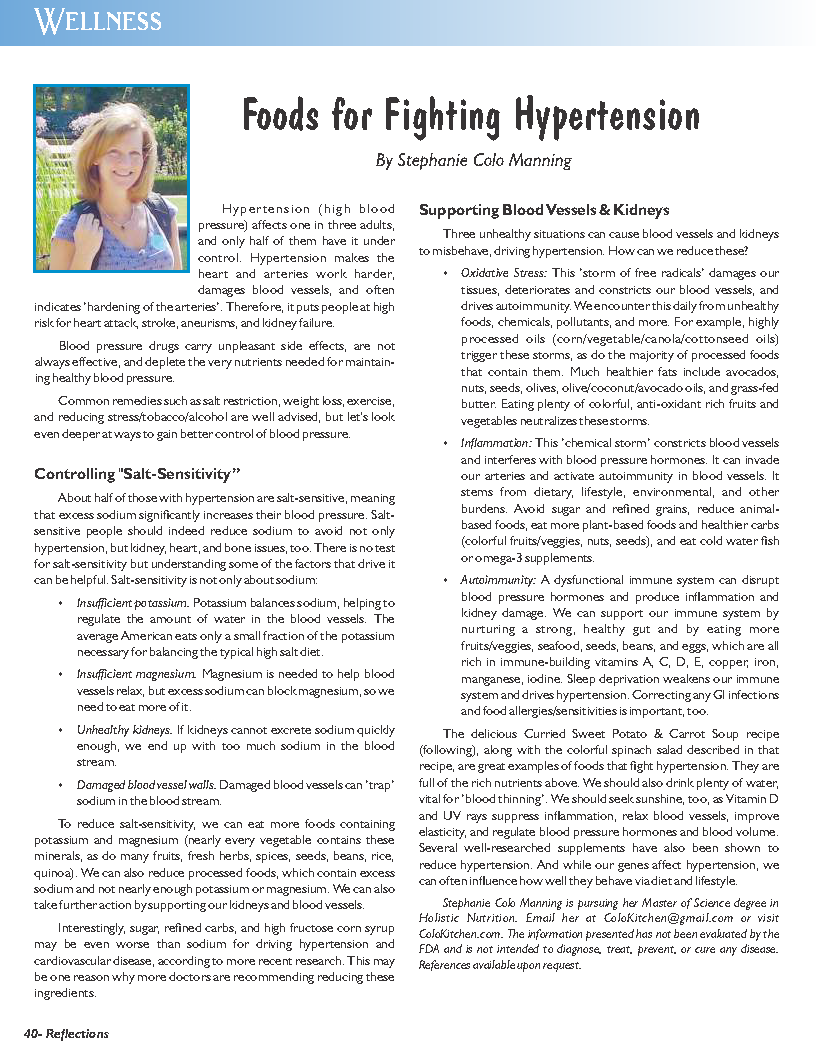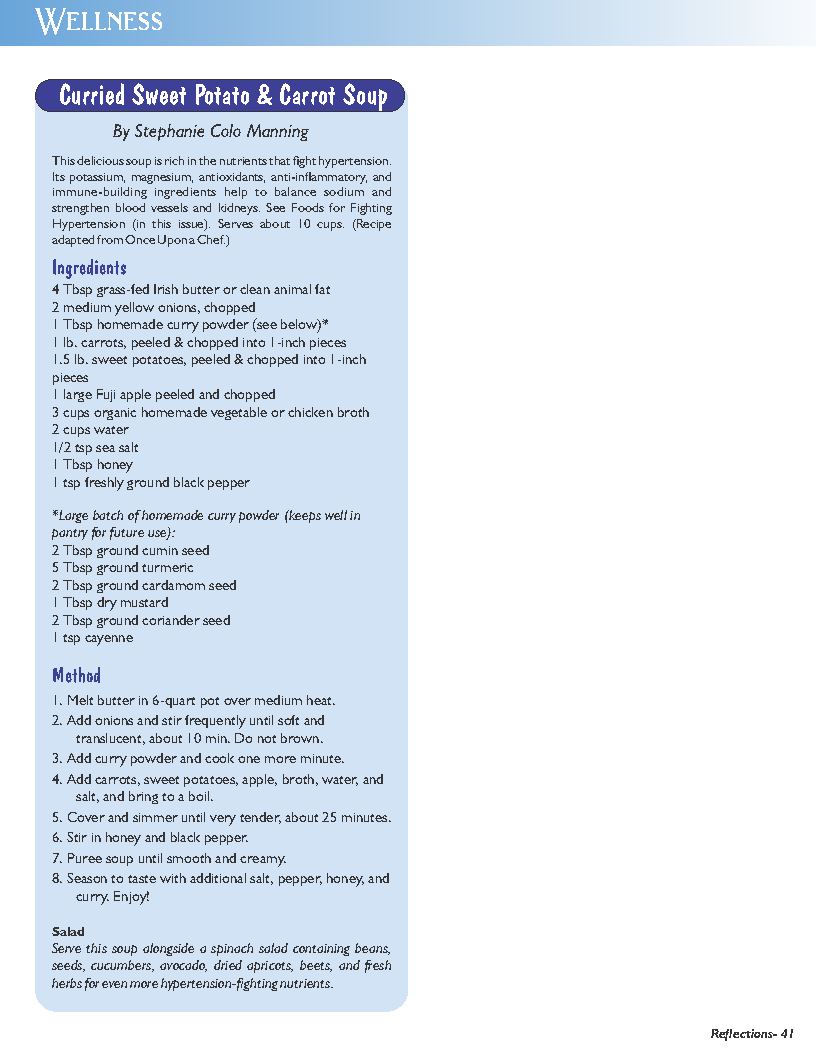Foods for Fighting Hypertension, Fall 2019
By Stephanie Colo Manning
Hypertension (high blood pressure) affects one in three adults, and only half of them have it under control. Hypertension makes the heart and arteries work harder, damages blood vessels, and often indicates “hardening of the arteries”. Therefore, it puts people at high risk for heart attack, stroke, aneurisms, and kidney failure.
Blood pressure drugs carry unpleasant side effects, are not always effective, and deplete the very nutrients needed for maintain- ing healthy blood pressure.
Common remedies such as salt restriction, weight loss, exercise, and reducing stress/tobacco/alcohol are well advised, but let’s look even deeper at ways to gain better control of blood pressure.
Controlling “Salt-Sensitivity”
About half of those with hypertension are salt-sensitive, meaning that excess sodium signicantly increases their blood pressure. Salt- sensitive people should indeed reduce sodium to avoid not only hypertension, but kidney, heart, and bone issues, too. There is no test for salt-sensitivity but understanding some of the factors that drive it can be helpful. Salt-sensitivity is not only about sodium:
- Insufficient potassium. Potassium balances sodium, helping to regulate the amount of water in the blood vessels. The average American eats only a small fraction of the potassium necessary for balancing the typical high salt diet.
- Insufficient magnesium. Magnesium is needed to help blood vessels relax, but excess sodium can block magnesium, so we need to eat more of it.
- Unhealthy kidneys. If kidneys cannot excrete sodium quickly enough, we end up with too much sodium in the blood stream.
- Damaged blood vessel walls. Damaged blood vessels can “trap” sodium in the blood stream.
To reduce salt-sensitivity, we can eat more foods containing potassium and magnesium (nearly every vegetable contains these minerals, as do many fruits, fresh herbs, spices, seeds, beans, rice, quinoa). We can also reduce processed foods, which contain excess sodium and not nearly enough potassium or magnesium. We can also take further action by supporting our kidneys and blood vessels.
Interestingly, sugar, refined carbs, and high fructose corn syrup may be even worse than sodium for driving hypertension and cardiovascular disease, according to more recent research. This may be one reason why more doctors are recommending reducing these ingredients.
Supporting Blood Vessels & Kidneys
Three unhealthy situations can cause blood vessels and kidneys to misbehave, driving hypertension. How can we reduce these?
- Oxidative Stress: This “storm of free radicals” damages our tissues, deteriorates and constricts our blood vessels, and drives autoimmunity. We encounter this daily from unhealthy foods, chemicals, pollutants, and more. For example, highly processed oils (corn/vegetable/canola/cottonseed oils) trigger these storms, as do the majority of processed foods that contain them. Much healthier fats include avocados, nuts, seeds, olives, olive/coconut/avocado oils, and grass-fed butter. Eating plenty of colorful, anti-oxidant rich fruits and vegetables neutralizes these storms.
- Inflammation: This”chemical storm” constricts blood vessels and interferes with blood pressure hormones. It can invade our arteries and activate autoimmunity in blood vessels. It stems from dietary, lifestyle, environmental, and other burdens. Avoid sugar and refined grains, reduce animal- based foods, eat more plant-based foods and healthier carbs (colorful fruits/veggies, nuts, seeds), and eat cold water fish or omega-3 supplements.
- Autoimmunity: A dysfunctional immune system can disrupt blood pressure hormones and produce inflammation and kidney damage. We can support our immune system by nurturing a strong, healthy gut and by eating more fruits/veggies, seafood, seeds, beans, and eggs, which are all rich in immune-building vitamins A, C, D, E, copper, iron, manganese, iodine. Sleep deprivation weakens our immune system and drives hypertension. Correcting any GI infections and food allergies/sensitivities is important, too.
The delicious Curried Sweet Potato & Carrot Soup recipe (following), along with the colorful spinach salad described in that recipe, are great examples of foods that fight hypertension. They are full of the rich nutrients above. We should also drink plenty of water, vital for “blood thinning”. We should seek sunshine, too, as Vitamin D and UV rays suppress inflammation, relax blood vessels, improve elasticity, and regulate blood pressure hormones and blood volume. Several well-researched supplements have also been shown to reduce hypertension. And while our genes affect hypertension, we can often influence how well they behave via diet and lifestyle.
RECIPE:
Curried Sweet Potato & Carrot Soup
by Stephanie Colo Manning
This delicious soup is rich in the nutrients that fight hypertension. Its potassium, magnesium, antioxidants, anti-inflammatory, and immune-building ingredients help to balance sodium and strengthen blood vessels and kidneys. See Foods for Fighting Hypertension (above). Serves about 10 cups. (Recipe adapted from Once Upon a Chef.)
Ingredients
4 Tbsp grass-fed Irish butter or clean animal fat
2 medium yellow onions, chopped
1 Tbsp homemade curry powder (see below)*
1 lb. carrots, peeled & chopped into 1-inch pieces 1.5 lb. sweet potatoes, peeled & chopped into 1-inch pieces
1 large Fuji apple peeled and chopped
3 cups organic homemade vegetable or chicken broth 2 cups water
1/2 tsp sea salt
1 Tbsp honey
1 tsp freshly ground black pepper
*Large batch of homemade curry powder (makes extra; keeps well in pantry for future use):
2 Tbsp ground cumin seed
5 Tbsp ground turmeric
2 Tbsp ground cardamom seed 1 Tbsp dry mustard
2 Tbsp ground coriander seed 1 tsp cayenne
Method
1. Melt butter in 6-quart pot over medium heat.
2. Add onions and stir frequently until soft and translucent, about 10 min. Do not brown.
3. Add 1 Tbsp of the homemade curry powder and cook one more minute (reserve remainder for future use).
4. Add carrots, sweet potatoes, apple, broth, water, and salt, and bring to a boil.
5. Cover and simmer until very tender, about 25 minutes.
6. Stir in honey and black pepper.
7. Puree soup until smooth and creamy.
8. Season to taste with additional salt, pepper, honey, and curry. Enjoy!
Salad
Serve this soup alongside a spinach salad containing beans, seeds, cucumbers, avocado, dried apricots, beets, and fresh herbs for even more hypertension-fighting nutrients.
Stephanie Colo Manning holds a Master of Science degree in Holistic Nutrition. The information presented has not been evaluated by the FDA and is not intended to diagnose, treat, prevent, or cure any disease. References available upon request.


